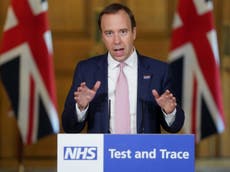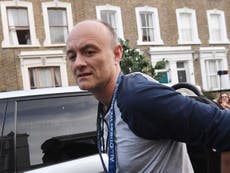My dad died lonely and distressed in a Barnard Castle care home – Dominic Cummings’s lack of remorse for his actions is shocking
The public are clearly angry about the lockdown trip – the government shouldn’t make an enemy of the people

My 93-year-old father died, alone, in a care home in Barnard Castle on 24 April. Neither I nor my sister nor indeed anyone else had been allowed to visit him for the previous five weeks owing to the lockdown, which was imposed early and without warning for care homes.
The lockdown was really bad for my dad who was lonely and distressed by the situation. I tried to keep his morale up by taking him notes and things he might enjoy, like chocolate and elderflower cordial, but it’s not the same as a visit. There’s been a lot of talk about modern technology – but Zoom calls don’t work if your hearing is bad and your eyesight poor so you can’t really see who it is on the screen.
On Easter Day he said to the carer, “Why can’t Helen visit, she only lives 200 yards away?” So I was shocked when I heard that Dominic Cummings, author of the lockdown, had been seen that very day wandering around Barnard Castle, having driven 260 miles from London.
My father wasn’t tested for Covid-19 and I am absolutely convinced the loneliness contributed to his death. This is borne out by the statistics.
Of the [25,000] “excess” deaths in care homes around half have been attributed to non-coronavirus causes. It is worrying that the lockdown seems to have been imposed without any assessment on people’s mental health, especially those suffering memory loss. For many, many people the lockdown has been a very hard experience.
It is Cummings’s failure to acknowledge this in his behaviour that is most hurtful. Nothing that he said in his press conference made any sense: if you were ill – and he said his wife was ill – you were told to stay at home, not drive 260 miles. There might be exceptions for vulnerable children – in law, that means children on the child protection register or in homes where there was domestic violence – but Mr Cummings and his wife are a happily married couple with no underlying health conditions, one child and a house in Islington.
Although the prime minister might think driving to Barnard Castle to test your eyesight is “very, very plausible”, the rest of the country can see this is an absolute joke. But the most worrying aspect of his explanation is that it was entirely about himself: his feelings and his family. Responsibility to others, the community and the country never seemed to enter his calculations. This is a public health emergency – that means we all have to take account of the public good as well as our own needs and families. This is what made it trebly difficult.
Since I first spoke about this other people have been in touch about their experiences. One man wrote about his brother, a 59-year-old with Asperger syndrome, who for the first time in March embarked on independent living, what his family hoped would be a new and happy chapter. He caught Covid-19 and died in hospital after two weeks when they couldn’t visit him.
These sacrifices were not chosen. Of course there have also been remarkable doctors, nurses and care workers who made heroic choices to leave their families to look after others.
A month ago the prime minister was talking about “avoiding tragedy” in his “apparent success”. Revulsion at this led to the establishment of the Covid-19 bereaved families for justice Facebook group. The Cummings episode has now angered the wider public. The apparent contempt for the rules and the absurd defence of what has happened demonstrates an arrogant presumption on the part of those who govern us that they are exceptional and an abandonment of common standards of decency.
This is not a political campaign or a media confection to be manipulated away. There has been too much heartache for too many people. Grief is not an emotion which can be managed away in a 24-hour news cycle. The bill for my father’s funeral has just turned up. Up and down the country people are having to deal with the weary burden of loss.
This country faces big challenges; to tackle them relies on trust. The government shouldn’t make an enemy of the people.
Helen Goodman was the Labour MP for Bishop Auckland from 2005 to 2019






Join our commenting forum
Join thought-provoking conversations, follow other Independent readers and see their replies